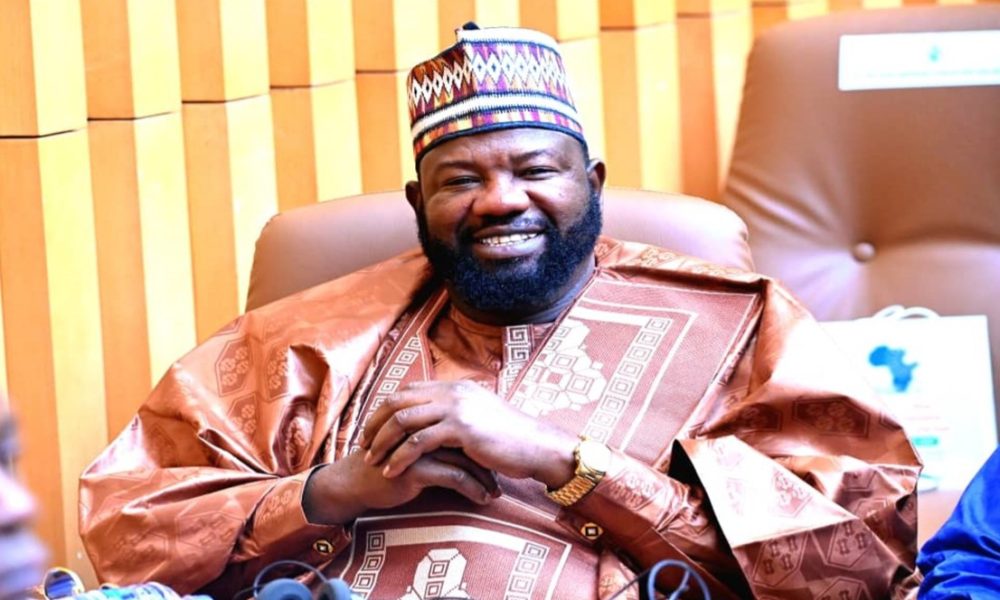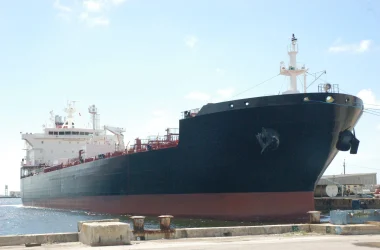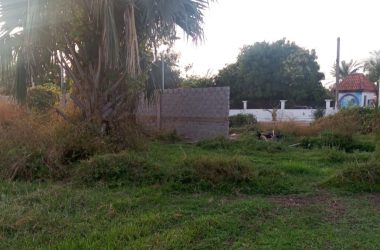GACH Mining Company has released a comprehensive rebuttal to an article published by The Republic titled “The Opaque Mining Deal Gambling with Gambia’s Future.” The company claims the report is riddled with inaccuracies, omissions, and misleading statements that distort the facts surrounding its operations and relationship with the government.
In a 14-point response, GACH addresses what it describes as speculative reporting, mischaracterized audit findings, and a lack of basic fact-checking. The company defends its license acquisition process, refutes allegations of favouritism, and highlights its corporate social responsibility initiatives across several communities.
GACH also criticises the article for disregarding official timelines and documentation previously shared with The Republic, and for selectively quoting studies to support a biased narrative. The company insists it operates transparently within legal and regulatory frameworks and calls on the newspaper to issue corrections.
Below is the full response issued by GACH Mining:
RESPONSE TO ARTICLE BY THE REPUBLIC TITLED: THE OPAQUE
MINING DEAL GAMBLING WITH GAMBIA’S FUTURE
We have read the latest publication by The Republic titled “the opaque mining deal
gambling with Gambia’s future”. While we appreciate every sincere attempt to
interrogate environmental governance on the Gambian coast, the piece does not meet
the evidentiary standards of true investigative journalism. Speculation is repeatedly
presented as fact, crucial context is omitted, and many of our own clarifications—
formally supplied to the newspaper in March—are truncated or ignored. In the interest of
accuracy and public understanding, we therefore provide a full rebuttal, point-by-point,
preserving every substantive detail:
1. Licence award misrepresented
The article from the opening states:
“a licence was already issued to GACH Mining Company, a business
a;iliated to Abubakary Jawara, now a known supporter of the Gambian
President.”
The wording is deliberately suggestive. By inserting “now a known supporter,” the
authors imply a causal link between Mr Jawara’s alleged political affiliation today
and a licence that was awarded then. The authors employed linguistic
manoeuvres to stealthily plant in the minds of the readers some impropriety or
favouritism in the acquisition of the licence. The authors intentionally omitted
our submissions which presented clear evidence that at the time of granting this
licence Mr Jawara was not acquainted with the president and the licence was
acquired through a competitive process and at arms length.
2. Honorary Consul Appointment Distorted
The article also states that Mr. Jawara was appointed as Honorary Consul General
of Gambia to Guangzhou China by the President, again to suggest a close
relationship between the president and Mr. Jawara which they seek to imply paved
the way for the mining license. The Authors again completely ignored the timeline
of events:
– Mr. Jawara had been honorary consul of the Gambia to China since
2006, under the Jammer government.
– His 23rd August 2012 re-appointment letter was an administrative
renewal issued by the Ministry of Foreign Affairs, not a personal gesture
from the President.
These dates are publicly available and easily verifiable. These dates were
provided to the authors but were ignored for the article.
3. EU-funded study selectively quoted.
The authors also misrepresented a funded by the EU by stating that the company
had caused the loss of 50% to 70% of household income representing up to
D10,000 a month. Thankfully the full report was linked in the article and the
excerpt was taken from page 8 under the heading Batokunku Old Sand Mine. The
full excerpt reads “The mine has had a greater impact on women than on men. At
household level, the mine has cost between 50 and 70% of household income,
representing up to 10,000 GMD per month. However, these losses depend on
whether the household owned or rented the land. The loss of income led to
migration between villages and districts, and for the families who remained, daily
life became difficult in the absence of replacement income”. In fact this section
goes into detail to describe the mines including even stating the part mined for by
GACH for HMC “…has only two facies: piles of sand stacked one on top of the
other and a pond for retaining/settling the water used to run the mine’s
machinery”. It further stated that “the southern part was exploited the longest
and it was here that sand was extracted at the beginning of the 20th century”.
Even though this report mentioned the substantial mining of this area from the
beginning of the 20th century which is in the 1990s. By divorcing the quotation from
its context, the newspaper converts a multi-decade, multi-operator impact into
an indictment of GACH alone.
4. Agricultural land, mineralized zones and compensation.
Contrary to the implication that we raged cropland without redress, large
sections of our concession lie within the Tourism Development Area (TDA)—a
corridor zoned primarily for tourism infrastructure and known mineralised zones
since the early 2000s. Where gardens overlapped active pits, we reached formal
agreements—witnessed by the Village Development Committees (VDCs) of
Sanyang and Batokunku—and provided compensation, including to gardeners
who established plots adter we had cleared scrubland for mining. We invited the
authors to verify these facts directly with the VDCs; instead, it quoted unnamed
“activists” and “community members” who “denied any knowledge of
compensation.”
5. Audit-report language altered.
Probably the most unfortunate falsehood of the article is the section titled
“Contract awarded “based on favouritism” “, which as a malicious play on an audit
finding which spoke about the “the high risk” that the license award was based on
favouritism. Even the audit findings that the authors relied on did not make any
conclusive findings but for some sinister purposes the authors chose to cut out
“the high risk” part of the quote, thereby transforming a cautionary observation
from the NAO into an alleged conclusion. Despite our elaborate response to this
allegation, The Republican chose to ignore tangible evidence and proceeded
make conclusions based on speculation and conjecture.
6. Factual errors – Mr. Jawara’s age.
In another absurd example of misrepresenting facts, the article describes Mr.
Jawara as being 45 years old which is false. Though not of significant importance
to the story it shows a broader pattern of inadequate fact-checking.
7. Timeline of the presidential interview
In what is again either a lack of capacity or a ploy to mislead the readers The laims
the President’s interview with The Fatu Network occurred “barely a week before”
Mr Jawara’s 2017 consul appointment and two months before the licence. The
video’s timestamp which is still viewable on Facebook through the link in the
article is 13 August 2018:
– Consul re-appointment: 23 August 2017
|
|
– Licence issuance: 20th October 20117
|
|
– Presidential interview: 13 August 2018
The interview therefore post-dates the consul letter by almost a year and
precedes the licence by two months—the opposite of the article’s sequence.
Again this information was available to The Republican but for reasons best
known to them they chose to ignore it.
8. GPPA Audit report findings misquoted
The Republican asserts that the National Audit Office in its 2018 Report said the
contract was single sourced without the approval of the Gambia Public
Procurement Authority. However, after looking through the audit report, which is
linked in the article by the Republican, nowhere is there any mention of a failure to
obtain approval from GPPA. This seriously misleading statement was conjured by
the authors and inserted in this article to lend credibility to their narrative. In the
spirit of being balanced and fair if The Republican had reviewed the mandate of
the Gambia Public Procurement Authority’s it will know that it covers public
procurement of goods and services and not mining rights. We are at a loss behind
the motives for such misleading statements.
9. Janneh Commission findings misaligned
In further demonstration of a lack of understanding/capacity, the authors stated
the that the Janneh Commission’s recommendation for a stop in the issuance of
mining licenses while the state conducts a rehabilitation, restoration and planning
of all previously mined areas, but 2 years before these recommendations the
licence was already issued. The licence was issued in 2017, and these
recommendations came out in 2019. Suffice it to say at the time the Licensing
process began the Janneh Commission was yet to be established and by the time
the licence was granted the commission was barely two months into its work.
Suggesting the Government overrode recommendations that did not yet exist is
grossly misleading.
10. Post-mining land-use proposals.
On our earlier intention to work with communities to convert mined zones into
tomato farms or fish farms, we provided cogent reasons why that could not be
accomplished because the lands were either under the GT board earmarked for
tourism related developments or were privately owned. We spoke at length about
out alternative actions such as rehabilitating the boreholes the Sanyang Women’s
Garden and other community focused interventions, but these were totally
ignored by the authors. The Republican failed to even verify and confirm the
rehabilitation efforts carried out by the company in Brufut or Batokunku.
11.Corporate Social Responsibility (CSR) programme ignored.
Our CSR record—arguably unrivalled among Gambian-owned extractive firms—
was supplied in detail to The Republican. Not a single initiative made it to to the
article but the authors continued to push the narrative that the communities have
not benefited from our operations. Some of these verifiable interventions include:
- – The complete renovation of the Sanyang Central Mosque
– Construction of a Police Station and immigration post in Sanyang after it was
burned during protests.
– The provision of a solar bore hole for the Sanyang Senior Secondary School
– The donation of 1000 bags of cement for the Sanyang Garage rehabilitation
– The construction of a waiting shed and vaccination room for the Sanyang
Health Centre.
– The Refurbishment of all boreholes at the Sanyang Women’s Garden
– Donation of a motorcycle to the Sanyang village messenger - – Rehabilitation and Modernisation of the Kombo South District Tribunal
– Annual Rehabilitation of the Road leading to the seaside.
– Rehabilitation of the Tujereng Mosque
– Funding of the construction of the Village Meeting shed at Alkalo’s
residence.
– Annual cash contribution as Corporate Social Responsibility to the Tujereng
Community to aid in development eForts. (2024 amount of D5,000,000)
– Annual Sponsorship of tree planting exercise to Environmental Concern
Group Gunjur.
– Provision of palliative support in the form of Rice to all mining communities
during Ramadan.
– Complete fencing of Community football fields in Kartong and Batokunku.
– Construction of Community stores for Batokunku to boost revenue for
community (On-going)
– Refurbishment of community road in Kachumeh
– Donation of coconut tree samplings at rehabilitated site in Batokunku
– Installation of solar streetlights in Batokunku, Sanyang and Tujereng.
– Construction of a pipe borne water distribution system from existing borehole
and tank system to 13 different points complete with taps in Batokunku to
reduce the strain on community members who have to walk long distances to
the central water point.
– Payment of diverse hospital bills for members of various communities
– Provision of 2 scholarships at university level for inhabitants of Batokunku
– Provision of 2 University Scholarships for community member from Konoto,
Kachumeh - – Rehabilitation of Beach bars in Tujereng community and support with
modest drinks stock for the tourist season.
– Financial Contributions to WCR NDMA for disaster Relief Efforts.
– Sponsorship of annual football tournament for areas in which we operate.
12. As a domestic company and one of the first domestic companies to engage in
mining at this scale we acknowledge that large-scale domestic mining is new
terrain in The Gambia. We welcome constructive scrutiny and continually refine
our practices in consultation with regulators, civil-society organisations, and the
communities themselves.
13. Investigative reporters wield enormous influence. That power demands rigorous
sourcing, contextual integrity, and a willingness to correct the record when errors
arise. We respectfully urge The Republican to hold itself to the same standards it
seeks from those it investigates.
14. We acknowledge the importance of environmental preservations and
rehabilitation, and we believe that this article could have served as the right
catalyst to galvanize actions but in a quest for the big scoop what was a great
opportunity has been poisoned by misrepresentations and sensationalism. We
never shy away from acknowledging our mistakes and trying to do better as a
company. In the same spirit we invite the authors to revisit their story and provide
a corrigendum to their article. One silver lining is this article shines a light on the
need to invest in capacity building for journalists to improve on understanding of
investigative techniques, journalistic ethics and the quality and accuracy of
journalistic outputs.
GACH Mining Issues Detailed Rebuttal To Investigative Report By The Republic





